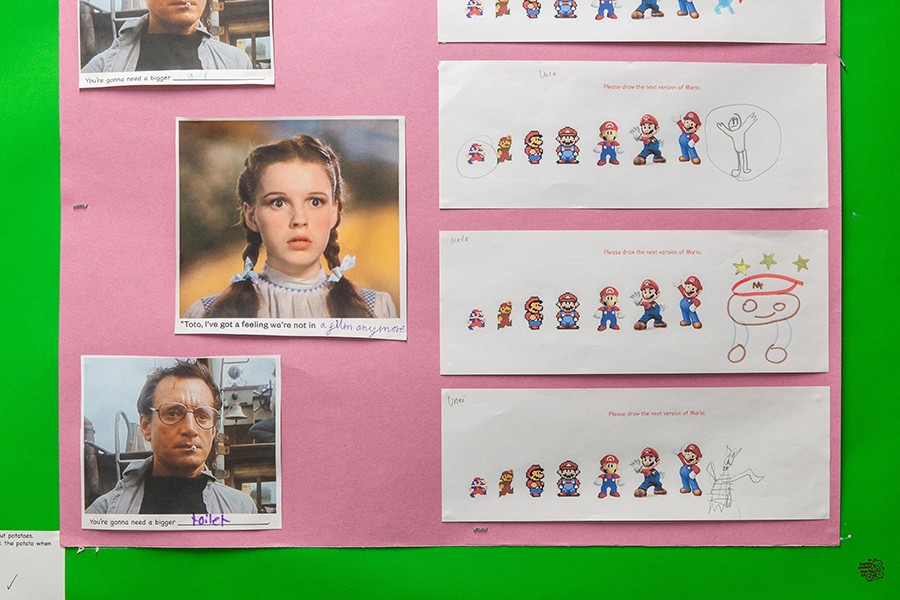Spaghetti Club Asks Children to Rethink Modern Art
A workshop at a primary school in east London provides an antidote to the seriousness of art criticism
A workshop at a primary school in east London provides an antidote to the seriousness of art criticism

In 1963, Donald Judd wrote a review of ‘Boxing Match’, an exhibition of four sculptors at Castelli Gallery, New York, for Arts magazine. On a Robert Morris scultpure, he remarks, ‘The proportions of the wheels are dumb.’ This unabashed honesty is what curatorial duo 650mAh, founded and run by Ella Fleck and Tabitha Steinberg, believe is missing from contemporary art criticism. In the weeks before lockdown, they presented a show of work by Spaghetti Club – an after-school art club at Grasmere Primary School in east London – at the Harlesden High Street gallery. The work resists the seriousness contemporary art by indulging a playful lightness with word and form only children could be capable of producing.

Michael Crowe, an artist and writer, and Emmi Beber, a writer and teacher, first envisaged Spaghetti Club as a creative-writing workshop. Over time, it has evolved to encompass photography, sculpture, drawing and dance. During hour-long sessions, students aged between six to ten complete worksheets laden with big names and simple tasks. One sheet presents the children with three sketches of the Guggenheim Museum Bilbao, by architect Frank Gehry, asking them to ‘add some extensions.’ While they are unlikely to know who he is, the children are unwittingly encouraged to decodify and parody Gehry’s style, forming a critique an adult would otherwise overcomplicate.
‘Each child knows they’re under no pressure to get anything right,’ warns the press release. Clad with paper display boards and framed with brightly coloured corrugated cardboard, the gallery walls remind me of classwork presentations at my own primary school. This curatorial framing felt familiar and unpretentious, far from infantilizing. One work is a child’s adaptation of a replica of Giorgio Morandi’s Natura morta (Still Life, 1955), which depicts an arrangement of cups, a sallow jug and a long-necked bottle. Next to this, the child has limned a second bottle with energetic pencil strokes. Theirs, like the jug, has tall sides that slope inwards, meeting at the scribbled bottlecap – the word ‘Fanta’ is scrawled across its body. What appears to be an intentional anachronism is far less complicated: Fanta was invented 15 years before Morandi would create the painting, and its original bottle had a similar shape to the one portrayed.

In Spaghetti Club, some assignments gravitate towards technical playfulness, prompting the children to create self-portraits by drawing their left sides with their left hands and vice versa, for instance. Others indulge wordplay (a series of semi-spherical, hand-formed blocks of white clay appear under a sign reading ‘Writer’s Block’) or nod to the absurd, dadaist humour exemplary of meme culture, asking the kids to ‘write a chat between Rainer and Michael’ (filmmaker Rainer Werner Fassbinder and West End star Michael Ball). Another implores the children to imagine they were a statue and to invent four responses – one for each of the years 1904, 1999, 2020 and 4000 – to the following question: ‘This is the famous bronze sculpture The Thinker by Rodin. It’s been around since 1904 [sic]! What has it been thinking?’ Next to 1904, one child wrote: ‘Why are buildings called buildings if there all ready [sic] built?’ For the same year, another child simply wrote: ‘Bum’. Adult visitors to the exhibition laughed as they surveyed these maps of the children’s thought processes, entertained perhaps by the realization of their own apathy.

Fun is the pervading sentiment of Spaghetti Club’s collaboration with 650mAh. As part of the show’s opening event, the children took turns launching a multicoloured rubber ball over their parents’ heads towards a netless basketball hoop, occasionally smacking someone in the face. When the ball landed at my feet, I saw a message scrawled on it in thick black ink: ‘If you score, count to 100.’ – and I was reminded again of the unjaded mind’s light-hearted embrace of creative approbation.
Main image: Spaghetti Club, 2020, installation detail at Harlesden High Street, London. Courtesy: Spaghetti Club and 650mAh, London; photograph: Rob Harris






















